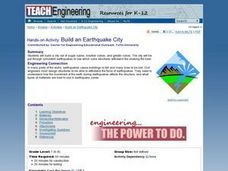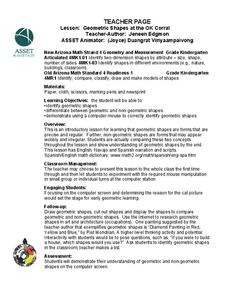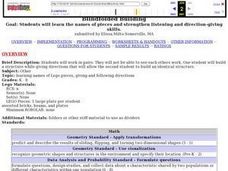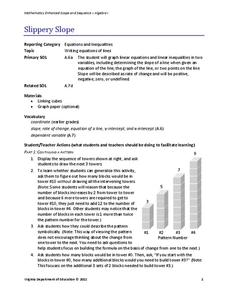Curated OER
Earth's Winds, Crust, and Atmosphere
This site provides a variety of activities and worksheets about the problem-based learning activity about Earth and its atmosphere. The lessons can be used separately or together in a geology unit. The resources and charts are very...
Curated OER
Mandalas, Polygons and Symmetry
Students create a geometric pattern using mandalas, polygons and symmetry. In this geometry lesson, students analyze the mathematics involved in making the mandalas, including the shapes and symmetry. Students create their own mandalas...
Curated OER
Patterns
Fourth graders investigate patterns and sequences. For this patterns and sequences lesson, 4th graders use a hundreds chart to build recurring patterns. Students skip count by threes and fives on a hundreds chart by coloring...
Texas Instruments
What's the Scale?
Pupils will analyze scales as related to models and real life in this geometry lesson. They work together to compare the dimensions on a model as compared to the real building.
Curated OER
Build An Earthquake City
Students work together to build an earthquake city. They simulate the shaking during an earthquake to discover if their structure is built well enough. They discover how engineers complete these types of tests to develop better...
Curated OER
Indians in Georgia
Students investigate technology used by Native Americans by examining their creations. In this Native American math lesson, students examine the overall area of Mississippian Indian mounds that were built hundreds of years ago....
Curated OER
Geometric Shapes at the OK Corral
Students explore geometry by utilizing computer software. In this shape identification lesson, students define several geometric shapes by the characteristics that classify them. Students draw and cut out geometric shapes using their...
Curated OER
TE Activity: Testing Fundamental Loads
Students experiment with the five fundamental load types that can act on structures. They use foam insulation blocks to which they apply the forces and draw the fracture patterns. They determine the telltale marks of failure that is...
Curated OER
Blindfolded Building
Students build a Lego design and then work with a partner to reproduce that design. They guide the building of the reproduction by description only and then check their work.
Curated OER
Ladybug Adventures
Students solve problems using mathematical skills. In this math lesson, the students use math concepts, to design a virtual path for a ladybug. The students will reinforce their skills in algebra and geometry concepts.
Virginia Department of Education
Slippery Slope
Explore slope using geometric patterns. Young mathematicians investigate towers built from cubes to develop a linear pattern. They move the data to a coordinate plane to connect the pattern to slopes.
Curated OER
Practice Writing Three-Digit Numbers
This online interactive activity defines what two-digit and three-digit number are and the place values found in each. A practice activity helps build proficiency with this skill by having learners fill in the 21 blanks with the...
Curated OER
Orden De Numeros
Matematica en Espanol. Students who speak, or are learning, Spanish will build their number sense by ordering numbers. They must determine the number that comes before, after, or between the provided examples. Tip: This presentation is...
Curated OER
Inverse (Indirect) Machines
Students observe relationships between quantities. Students complete activities for three different classes of levers. In groups, students build each type of lever. Students identify levers in their daily surroundings. Students observe...
EngageNY
Lines That Pass Through Regions
Good things happen when algebra and geometry get together! Continue the exploration of coordinate geometry in the third lesson in the series. Pupils explore linear equations and describe the points of intersection with a given polygon as...
West Contra Costa Unified School District
Factoring Quadratic Expressions
Factor in different strategies in a lesson plan for factoring quadratics. Young mathematicians first create tables and area models to factor quadratic trinomials into two binomials by guess and check. Learners then investigate how they...
University of Utah
Explore Proportional and Linear Relationships
Progress from proportional relationships to linear functions. Pupils first review concepts of proportionality covered in earlier grades. They then extend these concepts to linear functions, such as determining the slope of a...
Teach Engineering
Amusement Park Ride: The Ups and Downs in Design
Groups design the ultimate roller coaster by considering potential and kinetic energy. They test their designs using marbles and then go on to rate each group's design based on aesthetics, loop diameter, and cost.
West Contra Costa Unified School District
Adding by finding 10's
Count with ten frames in a first grade addition lesson. Kids determine how to identify numbers on a number line, as well as with ten frames, and complete ten frames to show their answers in several addition problems.
Education World
Predicting Pumpkins
If you want more pumpkin seeds, you should get a bigger pumpkin—right? Young harvesters use estimation skills to make a hypothesis about how many seeds they will find in a pumpkin before examining the real number inside.
Bowland
Pointzero: Confined
Groups plan their escape carefully. Three three-tiered puzzles help a story character escape their situation, each involving integer sequences, transformations, and geometric constructions. The teacher resource includes...
EngageNY
Sampling Variability in the Sample Mean (part 2)
Reduce variability for more accurate statistics. Through simulation, learners examine sample data and calculate a sample mean. They understand that increasing the number of samples creates results that are more representative of the...
Teach Engineering
The Great Gravity Escape
Groups simulate an orbit using a piece of string and a water balloon. Individuals spin in a circular path and calculate the balloon's velocity when the clothes pin can no longer hold onto the balloon.
Teach Engineering
Bridge Types: Tensile and Compressive Forces
Bridges rely on tension and compression to keep them standing. Pairs test this principle by constructing simple bridges and applying a force to the center. Teams use the provided worksheet to record their observations of the...























